Top10VPN is editorially independent. We may earn commissions if you buy a VPN via our links.
The Best VPNs for Routers
Our Verdict
The overall best VPN for routers is ExpressVPN, thanks to its excellent dedicated router app. It’s easy to install, compatible with most VPN-enabled routers, and it protects all your connected devices simultaneously.

Virtual Private Network (VPN) services are often incompatible with routers, or they require a long, complicated setup process to work properly.
Even if your VPN does offer router support, it may not be compatible with your particular router model.
The best router VPNs are VPN services that can easily be used on routers and are optimized for router performance.
This can include having a dedicated router app, partnering with third-party services to provide a ‘pre-flashed router’, or even making available simple setup guides for manual installation.
Summary: The Best Router VPNs of 2024
Based on our latest tests, we recommend the below VPNs for routers:
- ExpressVPN: Best Overall VPN for Routers
- NordVPN: Best VPN for Pre-Flashed Routers
- IPVanish: Best VPN for Manual Router Setup
- Proton VPN Free: 100% Free VPN for Routers
Why Trust Us?
We’re fully independent and have been reviewing VPNs since 2016. Our ratings are based on our own testing results and are unaffected by financial incentives. Learn who we are and how we test VPNs.
| VPNs Tested | 61 |
| Test Router | Linksys WRT3200ACM |
| Router Firmware Tested | DD-WRT, OpenWRT & Tomato |
We’ve tested over 61 VPNs on our Linksys WRT3200ACM router to identify the best VPNs for routers. These are different from VPN routers, which are WiFi routers that can support VPN software.
We manually installed every compatible VPN ourselves, making sure to evaluate the quality of each service’s setup guides as well as the difficulty of the process itself.
We also analyzed each VPN’s performance on our Linksys router, including the average download speed, its streaming performance, and how easy it is to use for beginners and experts alike. In this article, we explain the results of our testing.
Read our dedicated installation guide to learn how to set up a VPN on your router.
The Best Router VPNs Compared
You can find a selection of our test results and findings in the comparison table below:
Overview of Our Router VPN Recommendations
Using our unique testing methodology, we’ve identified the best VPNs for routers, including an excellent free option.
Our recommendations focus specifically on how easy the VPN is to set up on different router models, how easy it is to use the VPN once it’s installed, and how the VPN performs in both speed and streaming testing.
The very best router VPNs are quick to install, compatible with most router models, and encrypt the traffic leaving all of our devices without any issues.
See how our four recommendations compare in terms of router compatibility in the table below:
Below is a more detailed analysis of the five best router VPNs and why we recommend them.
The Best VPNs for Routers Analyzed
1. ExpressVPN: The Best VPN for Routers Overall
Ranked #1 out of 49 VPNs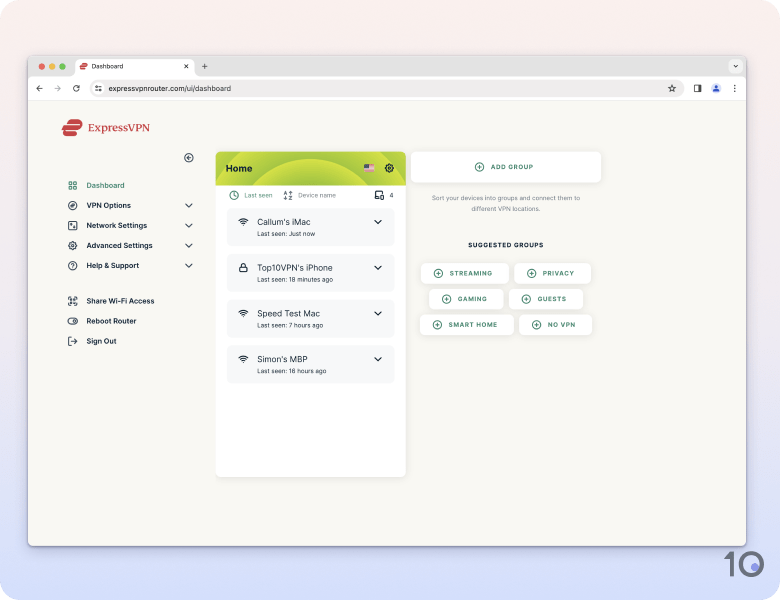
Dedicated App for Routers Yes Pricing Plans - $12.95/mo
- $6.25/mo over 16 months
- $4.99/mo over 28 months
Local Download Speed 85Mbps (15% loss) Servers 3,000 Compatible with Windows
Mac
iOS
Android
Linux
Amazon Fire TV
Android TV
Apple TV
Router
Chrome
ExpressVPN is the best VPN for routers due to its dedicated app that’s custom-built for routers.
Easy-to-use & fully-featured router app
With the removal of VyprVPN’s app, ExpressVPN is the only VPN service to provide a dedicated router app.
It’s easy to install ExpressVPN on your router, requiring no technical knowledge. We were able to install the app in less than two minutes on our Linksys WRT3200ACM test router.
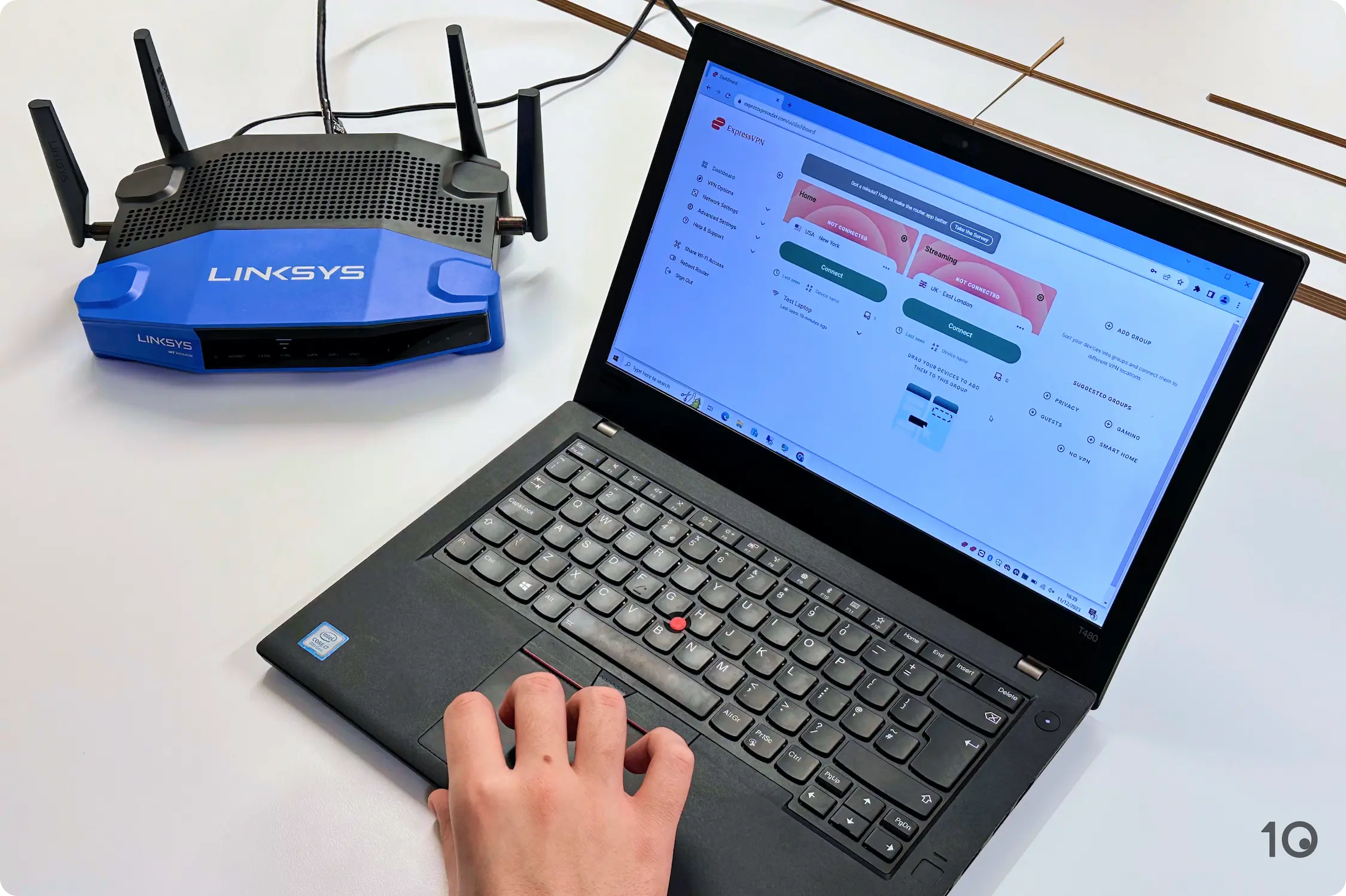
ExpressVPN’s router app as it appears on our test Windows device.
Once installed, you can access it from your browser where it functions in the exact same way as any other ExpressVPN app.
Unblocks multiple streaming services at once
Unique to the router app, you can use the feature ‘Device Groups’ to assign specific devices to different VPN server locations. For example, you can connect your Roku to a UK VPN server to unblock BBC iPlayer, while simultaneously assigning your smartphone to a nearby server location for the best possible connection speeds.
You can use ExpressVPN on your router to unblock 18 libraries, HBO Max, BBC iPlayer, Amazon Prime Video, and more.
Who Is ExpressVPN Best for?
You should use ExpressVPN if:
- You want a dedicated router app. ExpressVPN has the best native router app available, offering the same level of functionality as a desktop or mobile app.
- You want to unblock multiple streaming libraries. With ExpressVPN’s device group feature, you can unblock content in different regions simultaneously.
You should not use ExpressVPN if:
- You want a router VPN on a budget. At $4.99 per month, ExpressVPN is more expensive than many of its competitors. This is in addition to the price for a VPN-enabled router, too.
- You want to use WireGuard on your router. ExpressVPN does not support WireGuard and instead uses its own protocol, Lightway.
2. NordVPN: The Best VPN for Pre-Flashed Routers
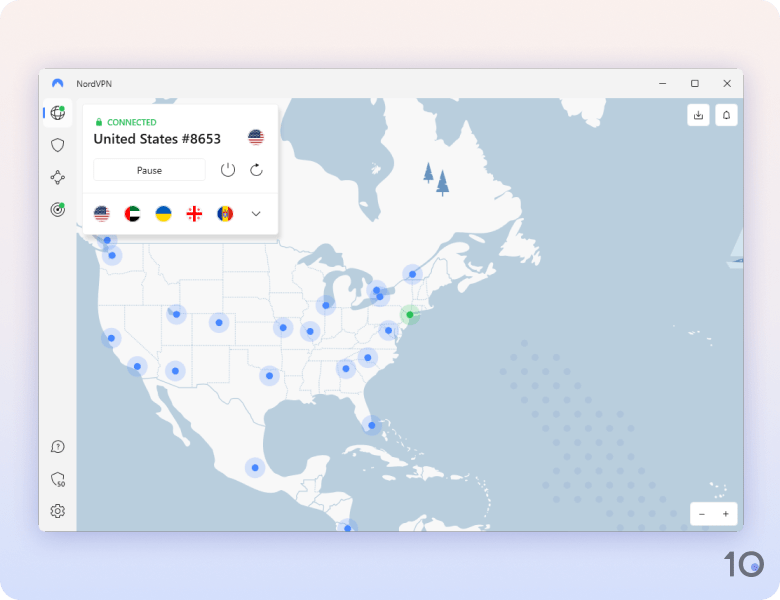
Dedicated App for Routers No Pricing Plans - $12.99/mo
- $4.59/mo over 15 months
- $2.99/mo over 27 months
Local Download Speed 86Mbps (14% loss) Servers 6,328 Compatible with Windows
Mac
iOS
Android
Linux
Amazon Fire TV
Android TV
Apple TV
Router
Chrome
NordVPN is a great VPN for routers due to its easy-to-use FlashRouters integration. It’s also one of the fastest VPNs we’ve tested and excels at unblocking geo-restricted streaming libraries.
Easy to install on routers
NordVPN can be manually installed on a variety of routers and firmware, and offers detailed setup guides for all of them.
The setup guides are well-written and easy to follow, with plenty of screenshots and videos to simplify the process. In the rare instances we were unable to understand a step, NordVPN’s 24/7 live chat support were on hand to help.
To skip setup altogether, you can buy a pre-flashed router equipped with NordVPN’s software from FlashRouter.
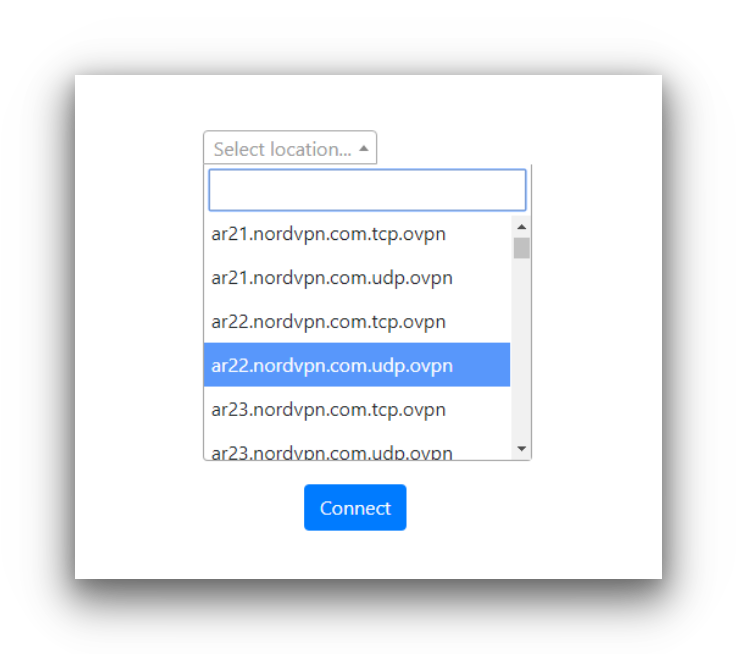
You can quickly switch VPN server locations within the FlashRouter privacy app.
NordVPN is fully integrated with the FlashRouter privacy app, providing you with a VPN kill switch, split tunneling support, and an easy-to-use interface. You can also use the app to easily switch VPN servers — this doesn’t require any resets or reinstallation of software.
Fast speeds & consistent streaming performance
We recorded fast connection speeds across all devices while connected to our NordVPN router, averaging out at an impressive 95Mbps.
By connecting to a US NordVPN server within the FlashRouter privacy app, we were able to consistently unblock US Netflix. This worked across all devices on our local network, including on our Xbox Series X and Amazon Fire TV Stick.
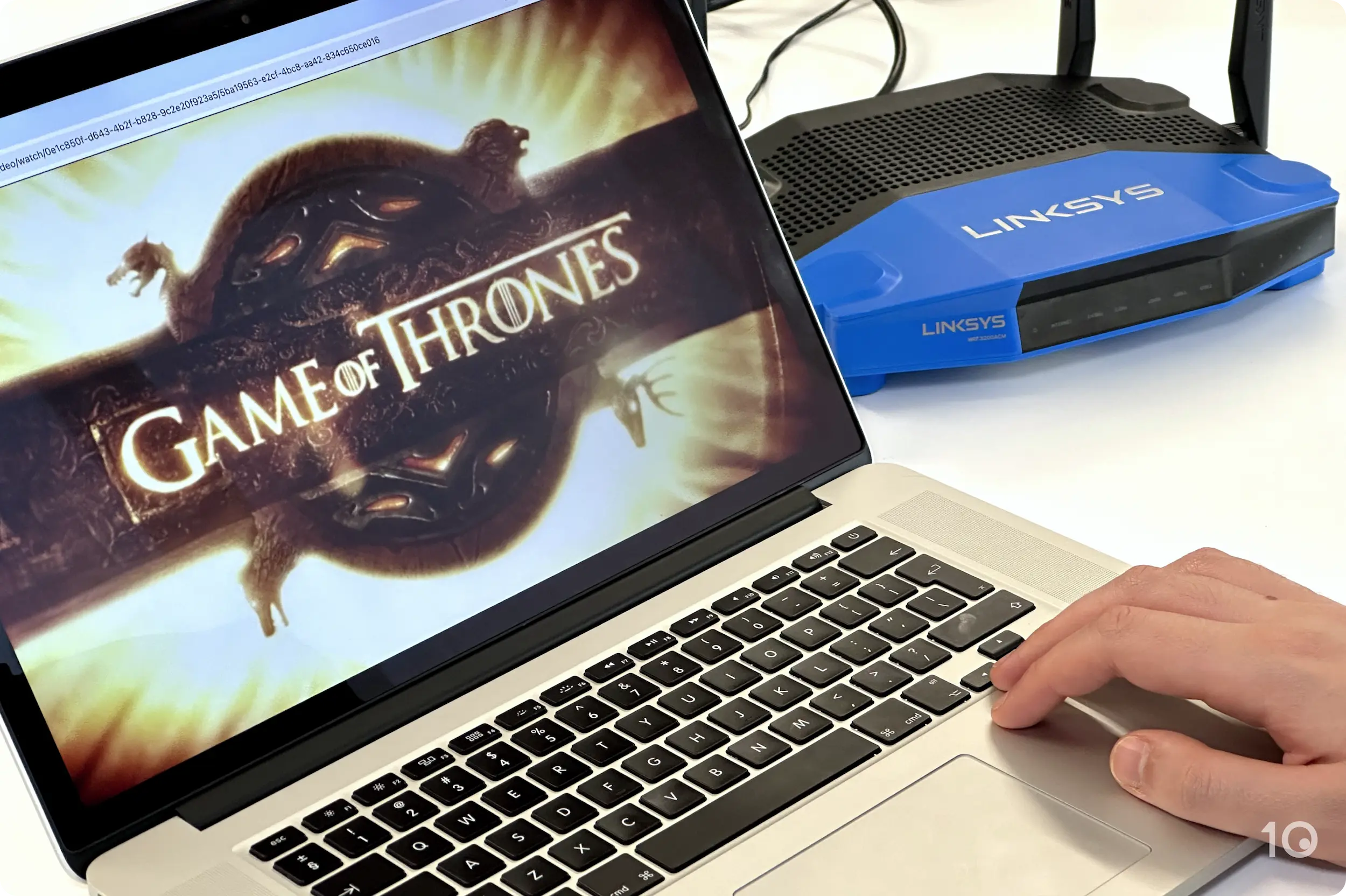
We installed NordVPN on our test router to stream Max in the UK.
Who Is NordVPN Best for?
You should use NordVPN if:
- You want to skip setup. NordVPN’s FlashRouter integration is one of the best we’ve tested and requires barely any setup.
You want fast speeds on your router. NordVPN is one of the fastest VPN available, and this is reflected in its impressive performance on routers.
You should not use NordVPN if:
- You want a dedicated router app. NordVPN’s FlashRouter Privacy app is excellent but it requires third-party support and is beaten by ExpressVPN’s native router app.
- You want a cheap VPN router. Buying a pre-flashed router is costly, as is subscribing to NordVPN.
3. IPVanish: The Best VPN for Manual Router Installation
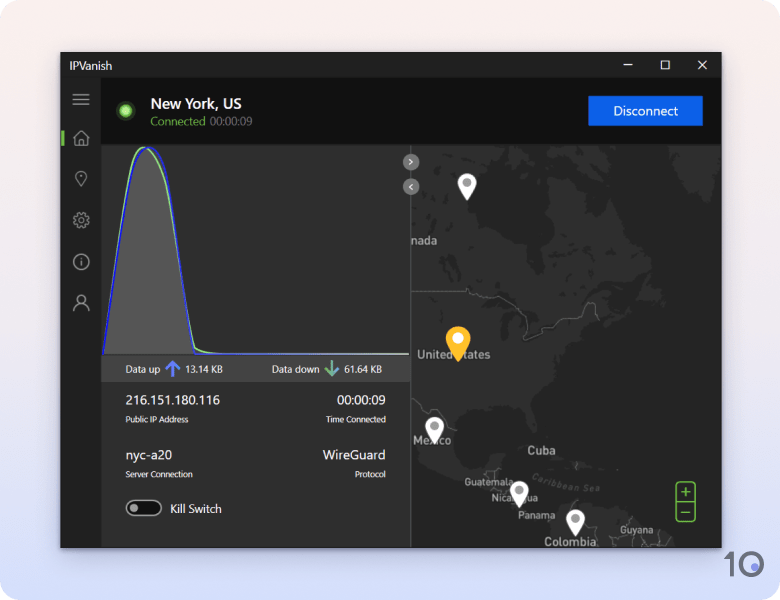
Dedicated App for Routers Yes Pricing Plans - $12.99/mo
- $2.79/mo over 12 months
- $2.19/mo over 24 months
Local Download Speed 88Mbps (12% loss) Servers 2,200 Compatible with Windows
Mac
iOS
Android
Linux
Amazon Fire TV
Android TV
Apple TV
Router
Chrome
If you don’t want to pay for a pre-flashed router, then IPVanish is the best VPN for manual router setup.
Quick and simple router installation
On IPVanish’s router setup page you can use the embedded search engine to filter by your router model. This will tell you if your router is compatible with IPVanish, along with all the possible setup methods and accompanying guides.
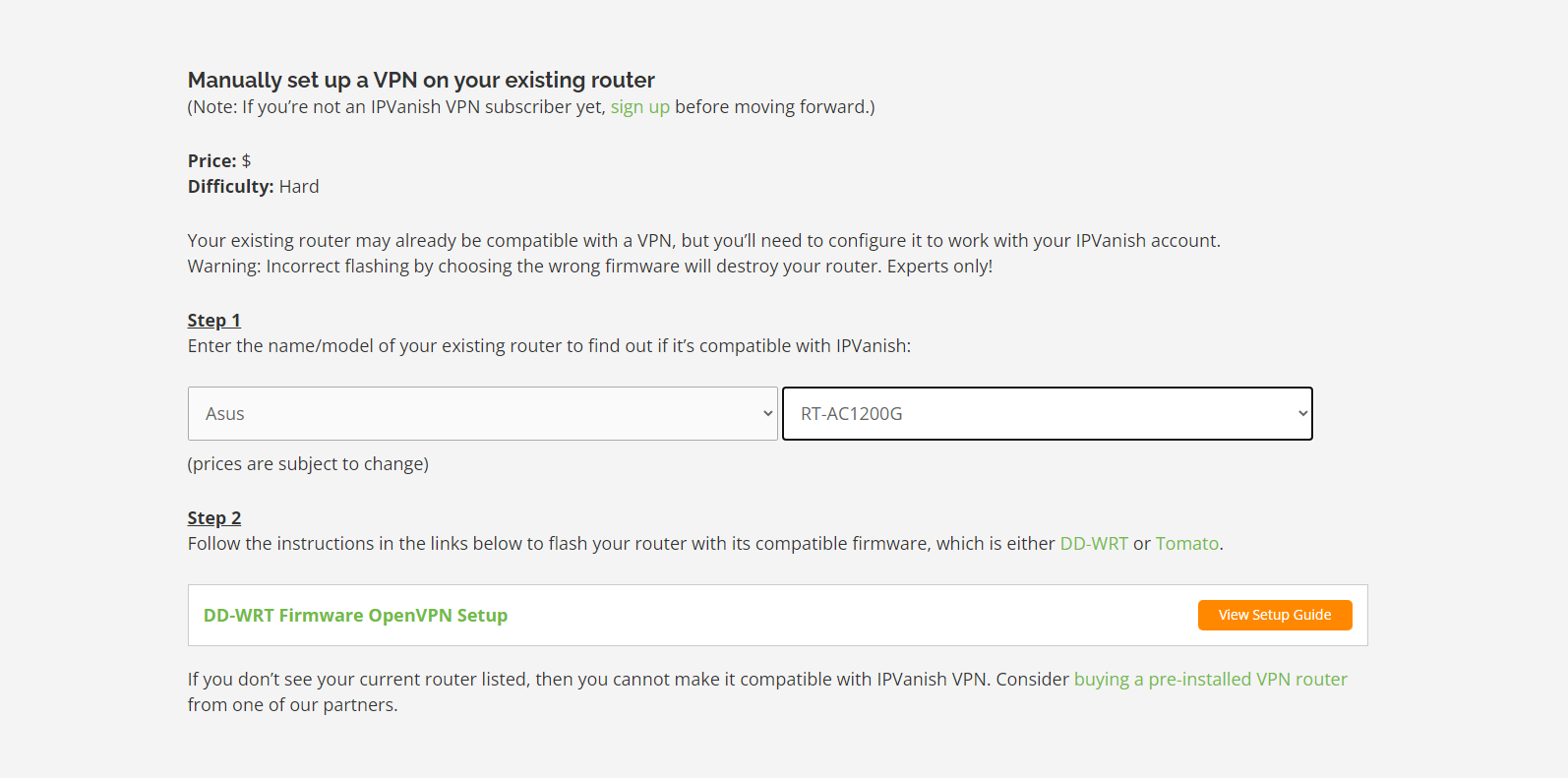
We found IPVanish’s website easy to use and navigate.
This is much better than other VPN websites, which are often difficult to navigate and lack the necessary information for router setup.
We were able to manually configure IPVanish on our Linksys WRT3200ACM test router without any issues. We were particularly impressed with how detailed its setup guides were including images, step-by-step instructions, and troubleshooting options.
Fast speeds, but average streaming performance
Once installed, IPVanish immediately encrypted the traffic leaving all of our connected devices and maintained an impressive average download speed of 95Mbps.
We were able to stream US Netflix and Hulu on our PC while connected to our test router.
However, IPVanish consistently failed to unblock Prime Video or HBO Max.
Who Is IPVanish Best for?
You should use IPVanish if:
- You don’t want to pay for a pre-flashed router. IPVanish is compatible with most routers and easy to set up so you can avoid the expense of a pre-flashed router.
- You want a straightforward manual router setup. IPVanish provides well-written and concise setup guides for a majority of router models.
You should not use IPVanish if:
- You want to unblock streaming services. IPVanish doesn’t work with Prime Video or HBO Max, which means any connected devices won’t be able to either.
- You want a bespoke router app. IPVanish hasn’t got a dedicated router app and its FlashRouters app isn’t as well-integrated as NordVPN’s.
Best Free VPN for Routers
Most free VPN services either paywall their router configuration files or impose a restrictive data cap. This makes it difficult to recommend a good free VPN for routers.
As a router VPN encrypts the traffic of multiple devices at once, it is absolutely essential that the VPN does not impose a data limit. This means trusted free VPN providers such as Windscribe Free and Hide.me Free can’t be recommended, as they’re limited by a data cap.
Some free VPN services are also known to sell your personal data to third-parties for profit, and can even infect your personal device with malware.
The only trustworthy VPN service that provides both unlimited data and router configuration files on its free plan is Proton VPN Free.
1. Proton VPN Free: Best Free VPN for Routers
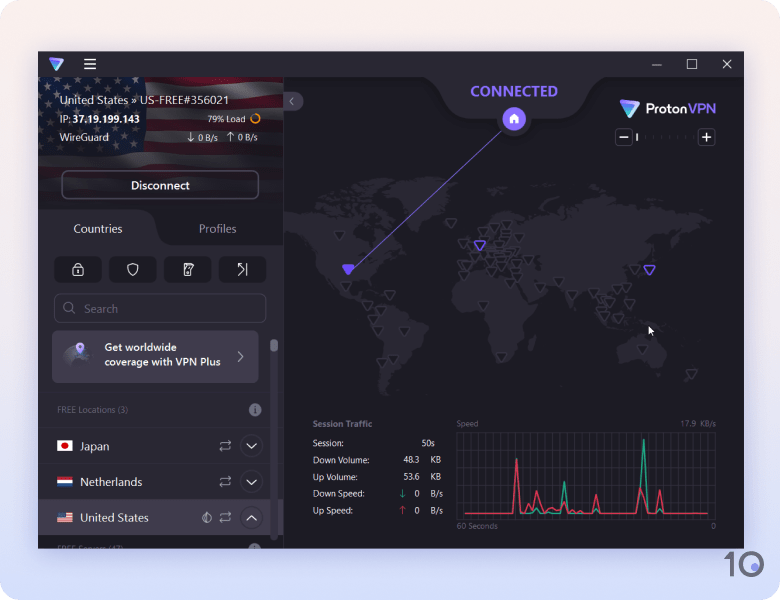
Dedicated App for Routers No Local Download Speed 85Mbps (15% loss) Servers 200 Compatible with Windows
Mac
iOS
Android
Linux
Amazon Fire TV
Android TV
Apple TV
Router
Chrome
Proton VPN Free is the only VPN service to support router configuration on its free subscription without imposing a data cap.
Free Tier Supports Router Installation
ProtonVPN Free is compatible with several router models and firmware including: Asus, Linksys, Tomato, and Vilfo.
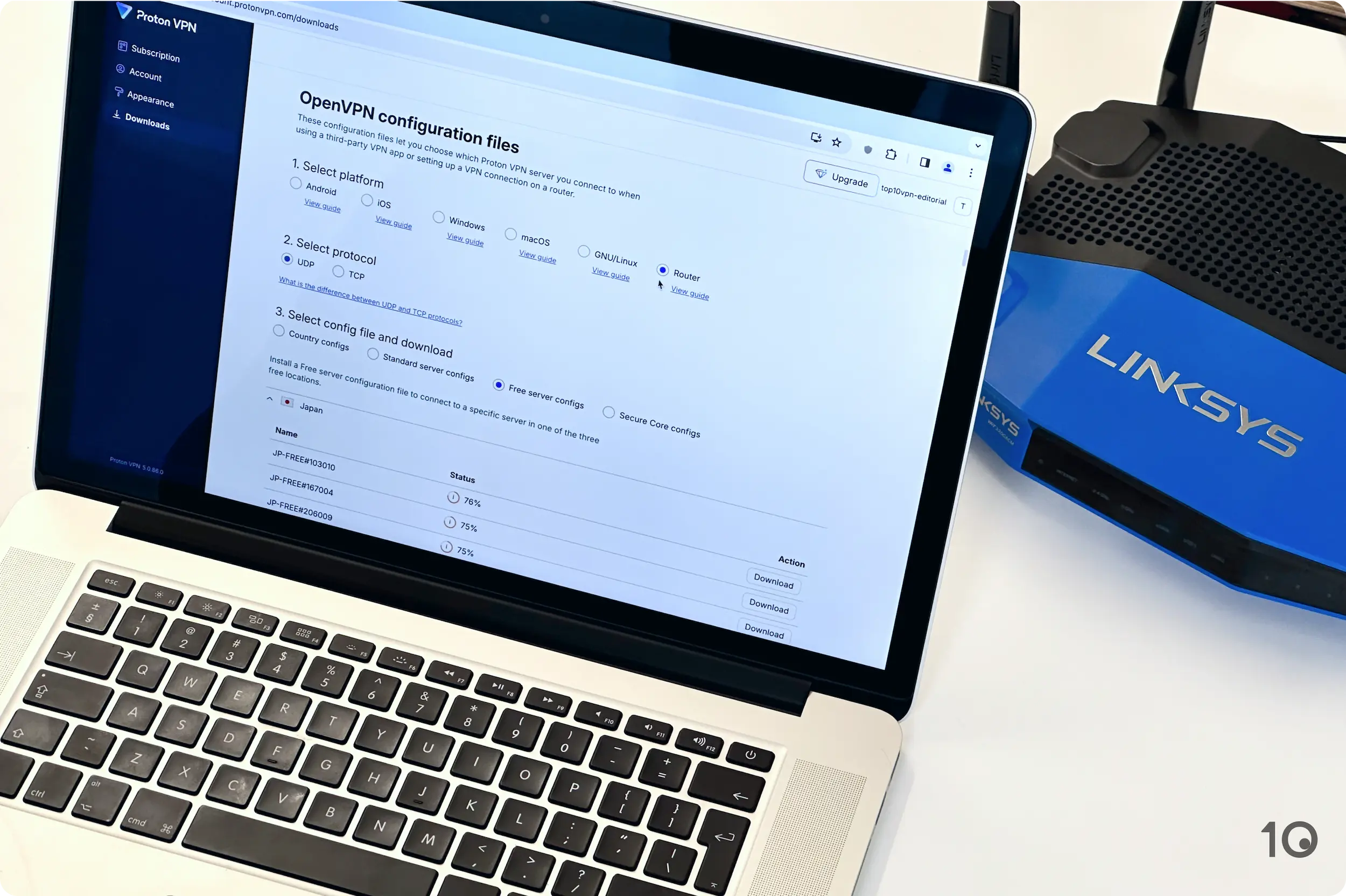
Setting up Proton VPN Free on our test router.
During our testing we were able to install ProtonVPN Free on our Linksys WRT3200ACM router but it took multiple attempts to work. This was a frustrating and often confusing process which wasn’t accounted for in any of Proton VPN Free’s setup guides.
Unlimited Data, but with Some Limitations
Unlike most free VPNs, Proton VPN does not cap your data. As such, it’s the only free VPN we tested to support both router installation and unlimited data.
Proton VPN is also one of the few free VPNs we trust due its excellent logging policy, association with the well-established ProtonMail, and trustworthy Swiss jurisdiction.
As a free service there are some significant drawbacks: you can’t torrent or unblock streaming services on ProtonVPN’s Free servers. These restrictions apply to every device connected to your router.
Also, you’re limited to just 5 server locations when configuring your router.
EXPERT ADVICE: If you’re serious about using a VPN with your router, we recommend choosing a paid service. Our top recommendation is ExpressVPN thanks to its dedicated router app. Otherwise you can use ProtonVPN Free and take advantage of its unlimited data.
Who Is Proton VPN Free Best for?
You should use Proton VPN Free if:
- You want a free router VPN. Proton VPN Free requires no payment details and doesn’t paywall its router configuration files.
- You want unlimited data at no extra cost. Proton VPN Free is the only trusted free service without a data cap.
You should not use Proton VPN Free if:
- You want to torrent or unblock streaming services. Proton VPN free blocks P2P activity and fails to bypass streaming blocks.
- You want fast connection speeds. Proton VPN Free is restricted to just 5 countries. If you’re not near one of these locations, then it’s likely your connection will be slower.
VPNs to Avoid Using on Your Home Router
We’ve reviewed 61 VPN services and applied our testing methodology to all of them.
Many of them lacked the features, performance, or usability necessary to qualify as a top VPN for routers.
Some VPN services simply aren’t safe enough to use on your router, either. They might carry dangerous malware or fail to properly encrypt your internet traffic.
Below we’ve listed four popular VPNs that performed poorly in our router testing and should be avoided:
FastestVPN
Overall Ranking: #18 out of 61 VPNs
Overall Rating: 6.7/10
What we don’t like: It took us multiple attempts to install FastestVPN onto our test router and, once installed, it failed to establish a VPN connection.
AirVPN
Overall Ranking: #29 out of 61 VPNs
Overall Rating: 5.5/10
What we don’t like: AirVPN’s router setup guides are poorly written and lack detail. We also couldn’t find any routers pre-flashed with AirVPN’s software online.
X-VPN
Overall Ranking: #32 out of 61 VPNs
Overall Rating: 5.4/10
What we don’t like: X-VPN has troubling ties to China, an intrusive logging policy, and disappointing torrenting speeds. It’s also not great if you want a router VPN on a budget, costing you $5.99 per month on its cheapest plan.
Router VPNs vs VPN Routers: What's the Difference?
Router VPNs and VPN routers are mistakenly used synonymously.
A router VPN is any VPN service that can be used on a router. This can be done through manually installing the VPN’s software onto a router, by downloading a dedicated router app, or by purchasing a pre-flashed router that supports the VPN’s software.
By contrast, VPN routers are WiFi routers with VPN software installed on it. They are routers with the necessary firmware to support VPN software, and often cost in excess of $300.
Why Use a VPN on Your Router?
While it’s easier to set up and use a VPN on computers and mobile devices, installing a VPN on your router provides some unique benefits:
- Continuous VPN protection.
- Protect devices that VPN services don’t provide custom apps for.
- Protect multiple devices under one VPN account.
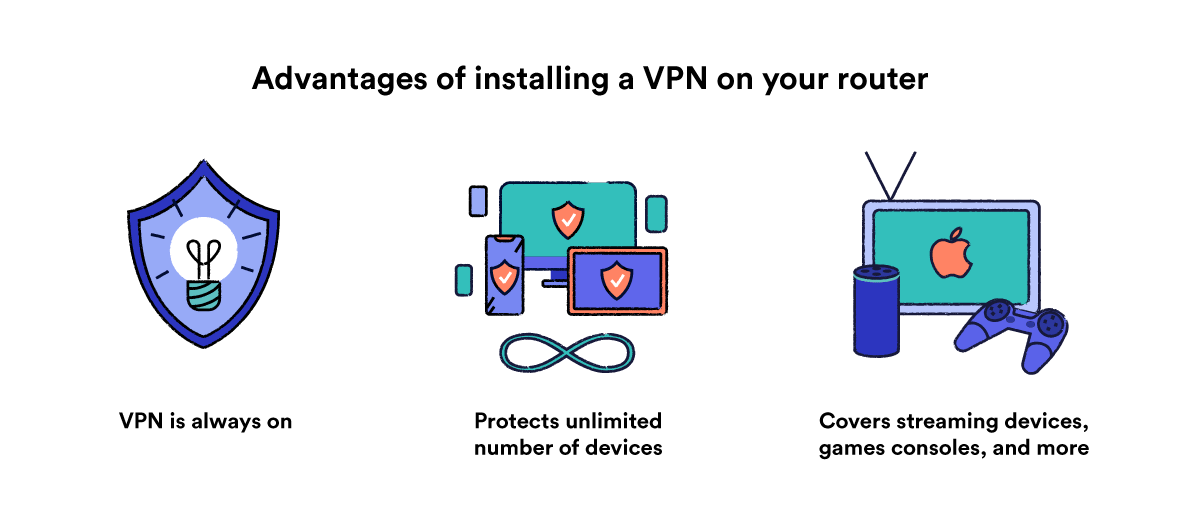
1Always-on VPN
As long as you keep your router switched on, the VPN connection will always be in place to encrypt your home’s internet traffic.
That means that you don’t have to wait for your computer to boot up fully before you benefit from VPN protection.
It also means once you only have to activate your VPN once (unless you want to change geo-location.
2Protects All Types of Internet-enabled Devices
You can’t install a VPN directly onto LG Smart TVs, games consoles, and many other popular devices.
But with a VPN at router level, you can cover all of your connected devices that don’t support native VPN software.
Your VPN automatically encrypts the traffic of every device that connects to your router. This also means that your real IP address will be hidden on all devices, as long as you connect to the internet via your router.
This protection also extends to Internet of Things (IoT) devices such as doorbell cameras, Amazon Alexa, and smart home appliances.
3Bypasses Simultaneous Connection Limits
VPN services usually limit the number of devices that can run the VPN at any given time to encourage users to upgrade to a more expensive package or buy a second VPN subscription.
Even top VPN services like ExpressVPN limit users to eight simultaneous connections, despite a substantial monthly fee.
Installing a VPN at router level allows you to protect multiple devices while only counting as ‘one’ VPN connection.
How to Use a VPN on Your Router
The user experience of using a VPN on your router can vary by method of VPN setup and the complexity of the VPN service’s interface.
Here’s the three methods for setting up a VPN on your router:
- Install a dedicated router app. This is the easiest method, you just need to install a VPN app onto your router.
- Buy a pre-flashed router. You can purchase a router with VPN software pre-installed from a third-party service. This skips setup altogether but can be expensive.
- Manually install VPN software. You can manually configure your VPN’s software to your router but this can be a lengthy process that risks damaging the router.
You can find the full instructions in our VPN router setup guide.
In general, a VPN at router level functions in the same way as a basic VPN app on desktop or mobile. This includes being able to spoof your geo-location, encrypt your internet traffic, and connect to a secure remote VPN server.
You can use a VPN service on your router to:
- Circumvent simultaneous connection limits.
- Unblock geo-restricted content in a specific location.
- Create a Double VPN connection.
- Protect all of your devices 24/7.
EXPERT ADVICE: For a greater level of VPN functionality, consider subscribing to ExpressVPN and installing its dedicated router app. You can use ExpressVPN’s router app to switch protocols, organize devices into different regions, and seamlessly change servers.
How We Test VPNs for Routers (Our Methodology)
We’ve developed an in-house methodology for testing router VPNs, covering several key parameters.
Primarily, we evaluate how easy it is to install and use the VPN on a WiFi router.
Additional consideration is given to the VPN’s overall performance and quality, including its average connection speeds, spread of server locations, and whether it can unblock geo-restricted streaming platforms.
For router VPNs specifically, we test for:
- A dedicated, intuitive router app.
- Varied setup methods including manual installation and pre-flashed.
- Secure & trustworthy encryption.
- Fast connection speeds for all devices.
- Multiple server locations to connect to.
- Unblocked streaming platforms and libraries.
Use the table below to see how each router VPN performed in our key testing categories:
Below is a more detailed breakdown of each of the areas we rate a router VPN on.
1. Router Compatibility: 30%
Minimum Requirement: A browser-based user interface with basic VPN functionality.
We Recommend: An easy-to-use, dedicated app for routers with multiple advanced features.
As a bare minimum, you should be able to access an interface to connect and disconnect your VPN connection. It should integrate seamlessly into your router settings and be easy to use.
For the best router VPNs, we expect an app specifically designed for routers. Whether that’s through a third-party, like FlashRouters, or through the VPN’s own software.
The app should be fully-featured with options to change VPN servers, enable a VPN kill switch, and configure split tunneling.
We also reward router apps that are easy to use, ideally its user experience and graphical interface should be identical to that of a desktop or mobile app.
2. Router Setup Difficulty: 25%
Minimum Requirement: Easy to understand instructions for popular router models.
We Recommend: Detailed installation guides for multiple router models as well as support for alternate setup methods.
VPN router setup can be a long and difficult process that can risk breaking your router if performed incorrectly.
We look for VPN services that provide well-written and easy to understand installation guides for a variety of router brands. The best VPNs go a step further and write instructions tailored to specific router models for each brand.
We also factor in the quality and availability of a VPN’s customer support as part of the setup difficulty score. The top-rated router VPNs provide multiple channels of support to assist every step of the setup process.
3. Security: 15%
Minimum Requirement: AES-128 or equivalent encryption.
We Recommend: AES-256 or Cha-Cha encryption.
Without sufficient encryption, your VPN router would function in the exact same way as a standard router or Smart DNS service.
Your VPN should use AES-256 or equivalent ciphers to encrypt the traffic of all devices connected to your router.
This protection extends to devices that can’t support native VPN software such as video game consoles, Smart TVs, and IoT devices.
4. Speed: 15%
Minimum Requirement: An average download speed loss of less than 20% on all connected devices.
We Recommend: An average download speed loss of less than 10% on all devices connected to the router.
A VPN service installed at router-level affects the download speed of every connected device.
Therefore, it’s essential you use a VPN service with the necessary infrastructure and performance to provide fast connection speeds and accommodate multiple devices.
A poorly-built VPN won’t be able to handle the demand of multiple devices which can impact your connection speeds.
5. Server Locations: 10%
Minimum Requirement: Multiple servers in your local region and neighboring ones.
We Recommend: Full access to the VPN’s server network.
We reward VPN services that make their entire server network compatible with router software.
Widespread server coverage ensures that you’ll always have a server nearby to connect to. This guarantees the fastest possible connection speeds by mitigating any speed loss caused by distance.
Having a greater number of server locations also increases your options for unblocking geo-restricted content. For example, having access to a single VPN server in the US means you can, in theory, unblock US Netflix, HBO Max, and Hulu.
6. Streaming: 5%
Minimum Requirement: Unblocks several Netflix libraries and Disney+.
We Recommend: Reliably unblocks US Netflix, your local Netflix library, Disney+, BBC iPlayer, and HBO Max.
Every device connected to your router is assigned the IP address and geo-location of your VPN’s server.
This means any streaming service your router-level VPN can unblock is also accessible by your connected devices, too.
The very best VPNs for routers can unblock multiple Netflix libraries (including US Netflix), HBO Max, Hulu, Amazon Prime Video, and more.
We also take into account how consistently a VPN can unblock a specific streaming platform over time to assess its reliability.
Lastly, we consider the time taken to load the video content and its overall picture quality.






